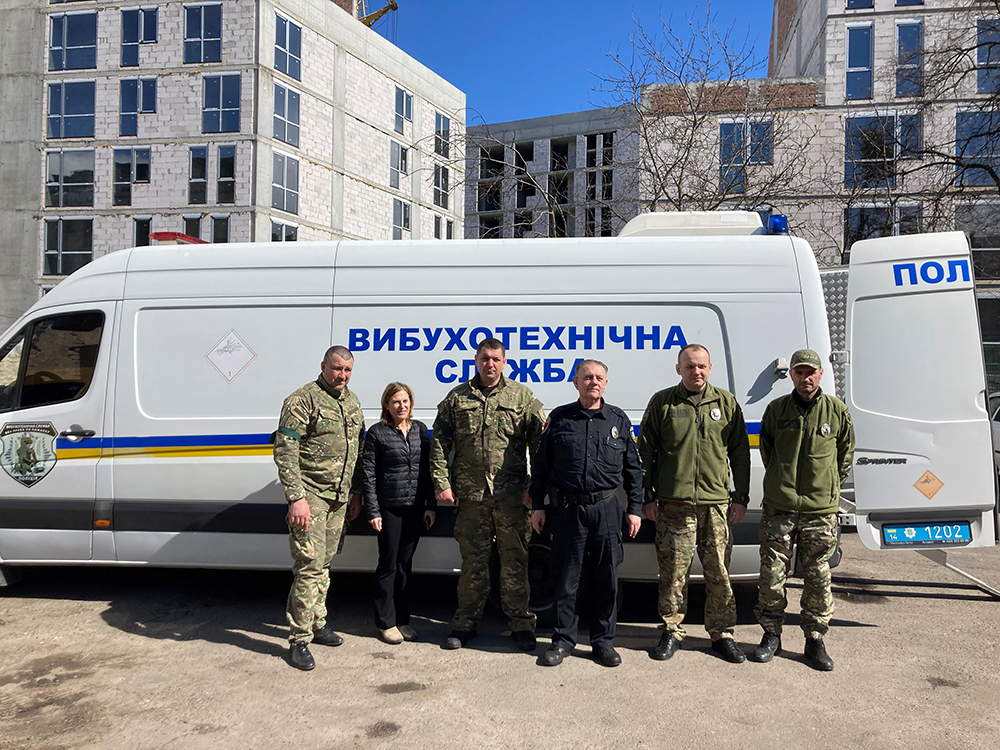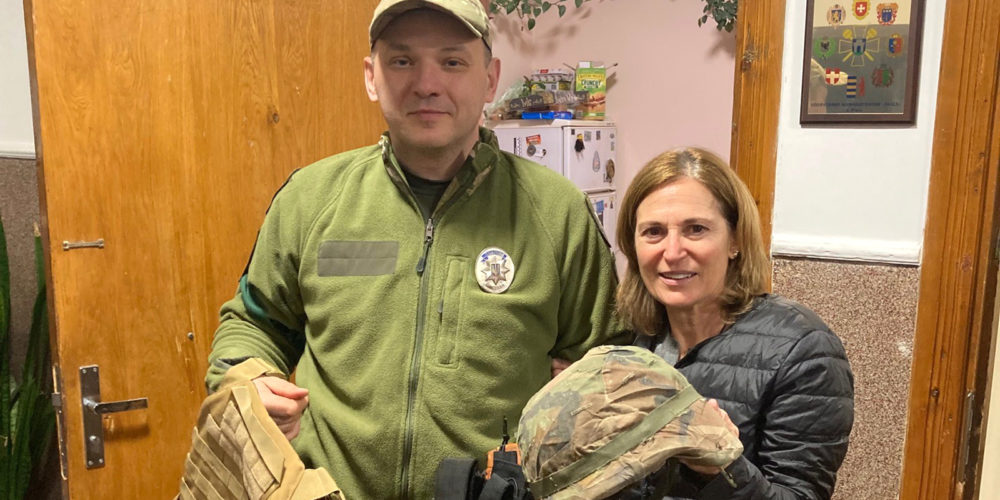During video calls, Oksana Bardygula (’87) is in a field of flowers. The virtual background is more than a cheerful touch. The sunflowers behind her are the national flower of Ukraine and they now symbolize resistance against the Russian invasion launched in February. As a vice president with Oliver Wyman CAVOK, Bardygula is part of a team that delivers technical consulting and services to global aviation, aerospace and rail industries. She is tapping this expertise to deliver humanitarian aid and raise awareness about the Russia-Ukraine War.
Her commitment to fight Soviet oppression goes beyond the keyboard. It is personal. As a first-generation American, she is the daughter of a father who was in a forced labor camp in World War II. Her parents fled Ukraine but never entirely left it behind.
She still has family in western Ukraine. “It is hard for me, one generation later, to ask, how could we be here again? How could the world just allow this to happen?”
Bardygula grew up in a Ukrainian neighborhood in New York City. Her parents preserved a cultural connection by speaking Ukrainian and sending their daughter to Ukrainian schools and folk dancing classes. “I didn’t have American friends until college,” she says.
A Florida university focused on aerospace was an unlikely choice. Cookies put her on her path. “I worked at a chain, David’s Cookies, and I met pilots from Eastern [Air Lines] at the store in the Sheraton. They all seemed to have gone to Embry-Riddle. So I sent for a brochure.”
Embry-Riddle also offered her something that would satisfy her parents’ ambitions for her: “You can be a doctor, lawyer or engineer,” her parents told her. Initially, the idea of escape that flight training represented fascinated her, but she shifted her focus to engineering. She was determined to prove wrong those who said women could not be engineers and return home with an acceptable degree.
“Because Embry-Riddle provided me with the education that led to a great career, I can actually do something for Ukraine.”
– Oksana Bardygula (’87)
After graduating with a bachelor of science in aerospace engineering, she joined McDonnell Douglas as part of a recovery, repair and modification team. “I absolutely loved it. I led a team of engineers and mechanics who went around the world fixing broken airplanes.” The work prompted her to earn her FAA Airframe certificate.
Today, she is in a position to encourage women in engineering. At Oliver Wyman, she is engaged in career development that helps women counter microaggressions and provides more than traditional mentorship and coaching. The company launched a sponsorship program that connects women with leaders so they gain opportunities that emerge from visibility.
When the war broke out in Ukraine, she had an unexpected opportunity to realize the power of her professional network, developed over more than 30 years.
Working with two U.S.-based nonprofits, she now asks airlines that fly from the U.S. into Western Europe for free or discounted cargo rates. They deliver tons of medical supplies and civilian defense items, including bulletproof vests. Money saved on cargo allows nonprofits to replenish the warehouses. Amerijet International Airlines was one of the first companies to get onboard. Bardygula acknowledges other airlines are helping through UNICEF and the American Red Cross or through Department of Defense or State Department arrangements.

In April, Bardygula witnessed the need for these supplies firsthand. She visited the country for two weeks and talked with nephews who are fighting and a cousin delivering aid. With her brother and friends, she delivered 68 suitcases of supplies to military hospitals, refugee camps and teams dismantling live ammunition. During her visit, airstrikes on Lviv killed 11. “We were not on the front lines, but we reached out to the second line.” Discovering how much soldiers appreciated simple items, such as socks and wet wipes, brought her to tears. She also served as a translator, helping people leaving Ukraine for Poland or returning to their homes in Ukraine.
As much as she appreciates the direct support from the aviation industry and the emotional support from friends who post, protest and donate, she is worried about compassion fatigue leading to dwindling support. She continues to educate others not just about the need but also about the potential for greater geopolitical stability if Putin is stopped. She has used speaking engagements, such as her appearance at MRO Americas, to advocate for Ukraine and to thank those who have helped.
She also thanks her alma mater.
“Because Embry-Riddle provided me with the education that led to a great career, I can actually do something for Ukraine.”
Bardygula is proud to be part of an industry that is always aiding humanitarian efforts, from delivering Covid-19 vaccines to rushing supplies to disaster sites and war zones. “Now I get to do that, in a very specific way that I know matters.”
She wonders if her aviation background prepared her to embrace a larger purpose in her life. However, she is sure she isn’t finished yet. Not in aviation. Not in making a difference.
